CIBBR NEWS ARCHIVE
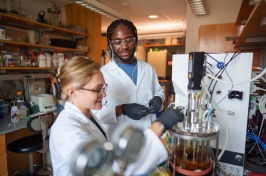 Wednesday, September 27, 2023National Institutes of Health Phase 2 award will accelerate innovative human health research at UNHThe University of New Hampshire’s Center of Integrated Biomedical and Bioengineering Research (CIBBR) has been granted a second $10 million award from the National Institutes of Health (NIH), enabling the center to continue advancing cutting-edge interdisciplinary research and foster innovation in the biomedical and bioengineering sciences to tackle complex challenges in human health and disease...
Wednesday, September 27, 2023National Institutes of Health Phase 2 award will accelerate innovative human health research at UNHThe University of New Hampshire’s Center of Integrated Biomedical and Bioengineering Research (CIBBR) has been granted a second $10 million award from the National Institutes of Health (NIH), enabling the center to continue advancing cutting-edge interdisciplinary research and foster innovation in the biomedical and bioengineering sciences to tackle complex challenges in human health and disease...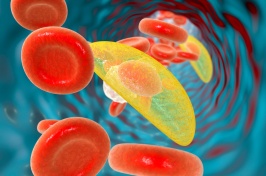 Wednesday, June 21, 2023New research investigates genetic “switches” of toxoplasmosis parasiteKey Finding The protein bromodomain protein 1 (or BDP1) plays a key role gene regulation to allow the parasite Toxoplasma gondii to infect and cause disease in its host. Key Terms Bromodomain protein 1 (or BDP1): A protein in Toxoplasma and related parasites that contains a bromodomain which gives it the ability to "read" marks on the genome and control gene expression. Cryptosporidium...
Wednesday, June 21, 2023New research investigates genetic “switches” of toxoplasmosis parasiteKey Finding The protein bromodomain protein 1 (or BDP1) plays a key role gene regulation to allow the parasite Toxoplasma gondii to infect and cause disease in its host. Key Terms Bromodomain protein 1 (or BDP1): A protein in Toxoplasma and related parasites that contains a bromodomain which gives it the ability to "read" marks on the genome and control gene expression. Cryptosporidium... Thursday, May 11, 2023UNH biomedical and bioengineering researchers explore innovative solutions to complex health conditionsScientific discoveries made by biomedical and bioengineering researchers at UNH over the past five years are transforming how a range of complex health conditions — from cancer and chronic wounds to neurological disorders such as Alzheimer’s and Parkinson’s — are being diagnosed, treated and prevented. Find this story and more in the latest issue of Spark, UNH’s annual research review, now live...
Thursday, May 11, 2023UNH biomedical and bioengineering researchers explore innovative solutions to complex health conditionsScientific discoveries made by biomedical and bioengineering researchers at UNH over the past five years are transforming how a range of complex health conditions — from cancer and chronic wounds to neurological disorders such as Alzheimer’s and Parkinson’s — are being diagnosed, treated and prevented. Find this story and more in the latest issue of Spark, UNH’s annual research review, now live...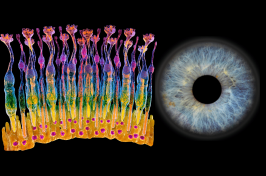 Tuesday, December 06, 2022New National Eye Institute grant supports research into degenerative eye diseasesA recently awarded $1.5 million grant from the U.S. National Institutes of Health’s (NIH) National Eye Institute will support ongoing research into retinal degenerative diseases led by Rick Cote, a professor in the molecular, cellular and biomedical sciences department and the director of the Center of Integrated Biomedical and Bioengineering Research (CIBBR) at UNH. This latest grant extends...
Tuesday, December 06, 2022New National Eye Institute grant supports research into degenerative eye diseasesA recently awarded $1.5 million grant from the U.S. National Institutes of Health’s (NIH) National Eye Institute will support ongoing research into retinal degenerative diseases led by Rick Cote, a professor in the molecular, cellular and biomedical sciences department and the director of the Center of Integrated Biomedical and Bioengineering Research (CIBBR) at UNH. This latest grant extends...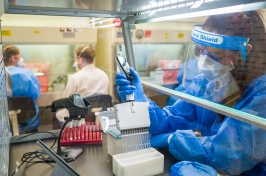 Wednesday, July 13, 2022With NIH grant, UNH will help understand COVID-19 variantsAs COVID variants march steadily through the Greek alphabet, UNH has received new funding from the National Institutes of Health to continue its genomic surveillance of COVID-19 variants in New Hampshire. The work could lead to better understanding of how specific variants increase transmissibility of the virus, evade the immune systems of those previously infected or increase severity of...
Wednesday, July 13, 2022With NIH grant, UNH will help understand COVID-19 variantsAs COVID variants march steadily through the Greek alphabet, UNH has received new funding from the National Institutes of Health to continue its genomic surveillance of COVID-19 variants in New Hampshire. The work could lead to better understanding of how specific variants increase transmissibility of the virus, evade the immune systems of those previously infected or increase severity of...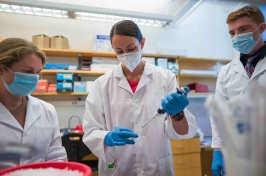 Tuesday, June 21, 2022Nutrition researcher named a faculty fellow in a National Heart, Lung, and Blood Institute funded programNutrition researcher Maria Carlota Dao, an assistant professor at the UNH College of Life Sciences and Agriculture and a New Hampshire Agricultural Experiment Station (NHAES) researcher, was recently selected as a faculty fellow with the Obesity Health Disparities Programs to Increase Diversity Among Individuals Engaged in Health-Related Research (OHD PRIDE) program at the University of Houston....
Tuesday, June 21, 2022Nutrition researcher named a faculty fellow in a National Heart, Lung, and Blood Institute funded programNutrition researcher Maria Carlota Dao, an assistant professor at the UNH College of Life Sciences and Agriculture and a New Hampshire Agricultural Experiment Station (NHAES) researcher, was recently selected as a faculty fellow with the Obesity Health Disparities Programs to Increase Diversity Among Individuals Engaged in Health-Related Research (OHD PRIDE) program at the University of Houston.... Tuesday, June 21, 2022Acts to inhibit “molecular scissors” that lets virus replicateKrisztina Varga, associate Professor of Molecular, cellular and Biomedical Sciences. Photo by Jeremy Gasowski. With the end of the pandemic seemingly nowhere in sight, scientists are still very focused on finding new or alternative drugs to treat and stop the spread of COVID-19. In a first-of-its-kind study, UNH researchers found that using an existing drug compound in a new way, known as drug...
Tuesday, June 21, 2022Acts to inhibit “molecular scissors” that lets virus replicateKrisztina Varga, associate Professor of Molecular, cellular and Biomedical Sciences. Photo by Jeremy Gasowski. With the end of the pandemic seemingly nowhere in sight, scientists are still very focused on finding new or alternative drugs to treat and stop the spread of COVID-19. In a first-of-its-kind study, UNH researchers found that using an existing drug compound in a new way, known as drug... Tuesday, May 17, 2022COVID response, Nature Groupie honored as Innovators of the YearDuring the COVID pandemic, many of us embraced two new activities: Swabbing our noses to test for the virus and getting outdoors. UNHInnovation’s Innovator of the Year awards recently honored UNH faculty and staff who helped us do both. W. Kelley Thomas, professor and director of the Hubbard Center for Genome Studies, and UNH Police Chief Paul Dean were honored for their contributions to UNH’s...
Tuesday, May 17, 2022COVID response, Nature Groupie honored as Innovators of the YearDuring the COVID pandemic, many of us embraced two new activities: Swabbing our noses to test for the virus and getting outdoors. UNHInnovation’s Innovator of the Year awards recently honored UNH faculty and staff who helped us do both. W. Kelley Thomas, professor and director of the Hubbard Center for Genome Studies, and UNH Police Chief Paul Dean were honored for their contributions to UNH’s... Tuesday, February 22, 2022UNH will lead $6M project to develop quality control sensorsResearchers in UNH’s Surface Enhanced Electrochemical Diagnostic Sensors (SEEDS) Lab have received an EPSCoR grant from the National Science Foundation for close to $6 million to lead a team in developing sensors to promote quality control in biomanufacturing — the production of important biomaterials used in medicine, food and even engineered human organs — a field that is becoming a significant...
Tuesday, February 22, 2022UNH will lead $6M project to develop quality control sensorsResearchers in UNH’s Surface Enhanced Electrochemical Diagnostic Sensors (SEEDS) Lab have received an EPSCoR grant from the National Science Foundation for close to $6 million to lead a team in developing sensors to promote quality control in biomanufacturing — the production of important biomaterials used in medicine, food and even engineered human organs — a field that is becoming a significant... Tuesday, October 19, 2021NIH funding supports innovative solution to chronic woundsThe researchers will synthesize the hydrogel containing two materials, gelatin and melanin from cuttlefish ink. Once applied to the wounded area, this hydrogel can deactivate the enzyme (MMP-9) by absorbing zinc ion from MMP-9. Kyung Jae Jeong and Young Jo Kim, associate and assistant professors, respectively, of chemical engineering, received a National Institutes of Health “Trailblazer”...
Tuesday, October 19, 2021NIH funding supports innovative solution to chronic woundsThe researchers will synthesize the hydrogel containing two materials, gelatin and melanin from cuttlefish ink. Once applied to the wounded area, this hydrogel can deactivate the enzyme (MMP-9) by absorbing zinc ion from MMP-9. Kyung Jae Jeong and Young Jo Kim, associate and assistant professors, respectively, of chemical engineering, received a National Institutes of Health “Trailblazer”...
